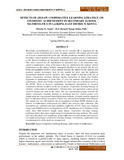| dc.contributor.author | Mbacho, Naomi W. | |
| dc.contributor.author | Githua, B. N. | |
| dc.date.accessioned | 2022-09-02T13:49:01Z | |
| dc.date.available | 2022-09-02T13:49:01Z | |
| dc.date.issued | 2013-07 | |
| dc.identifier.citation | Asian Journal of Management Sciences and Education, Vol. 2 No. 3, July 2013 ISSN: 2186-845X ISSN: 2186-8441 Print | en_US |
| dc.identifier.issn | 2186-8441 | |
| dc.identifier.uri | https://kerd.ku.ac.ke/handle/123456789/237 | |
| dc.identifier.uri | https://www.researchgate.net/publication/306129192_Effects_of_Jigsaw_cooperative_learn-ing_strategy_on_students%27_achievement_in_secondary_school_mathematics_in_Laikipia_east_district_Kenya | |
| dc.identifier.uri | http://www.ajmse.leena-luna.co.jp/AJMSEPDFs/Vol.2(3)/AJMSE2013(2.3-18).pdf | |
| dc.identifier.uri | https://www.projectreserve.com/2021/07/effects-of-jigsaw-cooperative-learning-strategy-on-students-achievement-in-secondary-school-mathematics-in-laikipia-east-district-kenya.html | |
| dc.identifier.uri | http://hdl.handle.net/123456789/6124 | |
| dc.description.abstract | Knowledge of mathematics as a tool for use in everyday life is important for the
existence of any individual and society. It equips students with unique and powerful
set of tools to understand the world and become productive members of the society.
Secondary school students in Kenya have continued to perform poorly in mathematics
at the Kenya Certificate of Secondary Education (K.C.S.E) national examinations.
This raises concern for all stakeholders in education due to the importance they
attach to mathematics. Some of the factors that are attributed to the students’ dismal
performance in the subject include; inadequate facilities in the schools like the text
books and qualified teachers, poor attitude towards the subject by the students and
teachers, gender stereotypes, lack of role models for girls, and the ineffective
instructional methods used by teachers. This study sought to find out if the use of
Jigsaw Cooperative learning Strategy during instruction of Surds and Further
logarithm in mathematics to form three 17 year old students had effects on their
performance. Surds and Further logarithm are topics that are performed poorly at
the KCSE. There is however inadequate documented information in research
conducted in Kenya on effects of the use of Jigsaw Cooperative learning Strategy on
students’ achievement in mathematics. Solomon four non-equivalent control group
research design was used in the study. The two experimental groups received the
Jigsaw cooperative learning Strategy as treatment and two control groups were
taught using the conventional learning/teaching methods. A simple random sample of
four co-education district secondary schools was selected from Laikipia East District.
The sample size was 160 students out of a population of about 20,000 students in the
district. A mathematics achievement test (MAT) was used for data collection. The
instrument was validated and had reliability coefficient of 0.87. Data was analyzed
using t and ANOVA tests to test hypothesis at 0.05 significance level. Findings of this
study show that learners taught using Jigsaw cooperative learning strategy
performed better than those taught using Conventional learning methods. The results
also show that there is no significant gender difference in achievement when learners
are taught using Jigsaw cooperative learning strategy. Conclusions, implications and
recommendations of the study are summarized. | en_US |
| dc.language.iso | en | en_US |
| dc.subject | Jigsaw Cooperative learning Strategy, achievement in mathematics | en_US |
| dc.title | Effects Of Jigsaw Cooperative Learning Strategy On Students’ Achievement in Secondary School Mathematics In Laikipia East District, Kenya | en_US |
| dc.type | Article | en_US |

